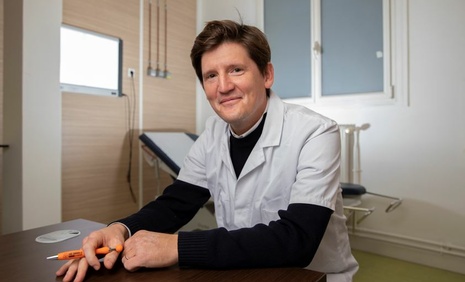Breast cancer: a simple blood test to improve therapeutic choices
How to choose the best treatment for women suffering from certain metastatic breast cancers, which are particularly difficult to treat? Prof. François-Clément Bidard, medical oncologist, has been invited by the American Association for Cancer Research (AACR) to present the national clinical trials initiated by Institut Curie on circulating biomarkers.

New "liquid biopsy" techniques involve, on the one hand, circulating tumor cells, which are cancerous cells that have escaped from a tumor, and on the other hand, circulating tumor DNA, which is a genetic material released into the blood by tumor cells. Detecting these markers using reliable techniques, checking that they provide additional information and demonstrating the fact that considering these markers helps to improve outcomes for cancer patients: these three steps require a great deal of work, in which Institut Curie has developed internationally renowned expertise.
At the world meeting on cancer biology, Prof. Bidard, medical oncologist at Institut Curie and professor of medicine at the University of Versailles-Saint-Quentin/Paris Saclay, was invited to talk about two major French studies that he initiated and that aim to make better treatment choices. In total, almost 1,800 women treated for metastases from hormone-dependent breast cancer (which accounts for 70% of breast cancers) took part and are still taking part in these innovative studies.
When a so-called "hormone-dependent" cancer develops metastases, physicians generally prescribe hormone therapy, which is better tolerated by patients, and prescribe chemotherapy only for women suffering from forms of cancer considered to be more serious. Within this context, a first major trial (STIC CTC), launched in 2012, and the results of which have just been made known, shows that the choice between chemotherapy and hormone therapy would be improved by being adapted to the quantity of circulating tumor cells, which is a very good indicator of how aggressive the disease is (though its use is not yet recognized or paid for by French national health insurance). A second trial on a national scale (PADA-1) has been under way since 2017. Its aim is to detect the appearance in circulating tumor DNA of mutations showing resistance of the cancer to hormone therapy, and to assess whether or not a change in hormone therapy would help overcome this resistance. The first international trial of its type, PADA-1 uses technological innovations developed in the Genetics unit at Institut Curie, in collaboration with Dr. Marc-Henri Stern's Inserm team. Its findings will be known in two to three years, but PADA-1 is already eliciting strong interest from the researchers gathering in Atlanta from March 29 to April 3.



